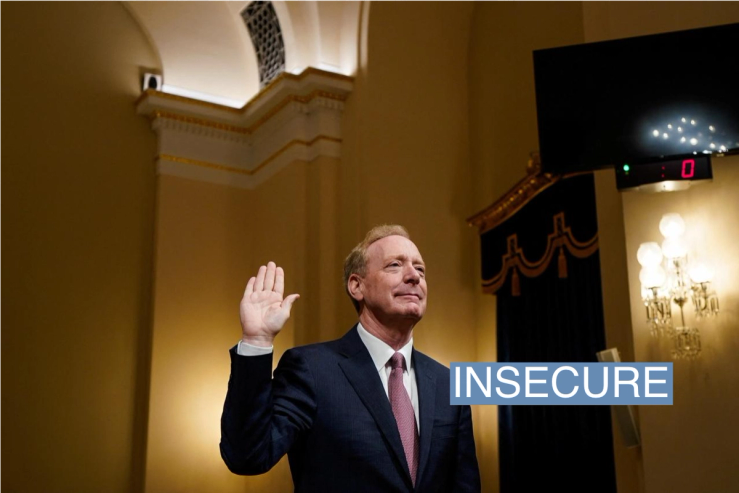
Semafor Signals
Microsoft says it will prioritize security over AI after cyberattacks
Insights from NBC News, Binding Hook, and Tidal Cyber

The News
Microsoft vowed to focus on security after a bug in its system allowed major cyberattacks by Russia and China to steal government officials’ data through unsophisticated means.
The company’s President Brad Smith told Congress Thursday that cybersecurity would be an even higher priority for the firm than artificial intelligence, with CEO Satya Nadella “personally” taking overall accountability for security.
SIGNALS
Experts worry about AI-powered ‘cyber-physical’ attacks
Experts are increasingly concerned about artificial intelligence-powered “cyber-physical” attacks that target critical infrastructure like electric grids and transportation systems. Chinese government hackers have been targeting US systems, the FBI has alleged, and while a Russian military hackers’ cyber-physical attack against Ukraine’s energy grid last year was eventually thwarted, it showed the speed at which such an attack could be readied, a cyber espionage analyst wrote for Binding Hook. Still, nation-states have so far avoided attacks on physical infrastructure as they could be seen as acts of war: One MIT professor told NBC News, “The only thing really keeping bad things from happening is there is not sufficient motivation.”
AI could help less sophisticated hackers
Artificial intelligence risks lowering the barrier of entry for less sophisticated hackers, Britain’s National Cyber Security Centre warned in a January report. But hackers are also exploiting AI-driven techniques to breach even the most robust cyber protection programs, such as by using advanced machine learning algorithms to identify their weak spots, according to Forbes’ Technology Council. Most cyber defenders are ill-equipped to go up against the adaptability of AI-driven attacks, which may also be able to hide their own traffic patterns.
Two-thirds of countries going to the polls this year at risk of cyber attacks
Two-thirds of all countries holding elections in 2024 face cyber threats, according to recent research by Tidal Cyber, including disinformation campaigns and attacks disrupting the electoral process from at least one state-backed cyber threat actor linked to Russia, China, or Iran. China was said to be behind a particularly intense wave of cyber attacks during Taiwan’s elections in January, and Beijing allegedly spearheaded cyber campaigns targeting Britain’s Electoral Commission. However, trade links with China complicated the UK’s efforts to enforce tough measures against Beijing, the Financial Times reported.
